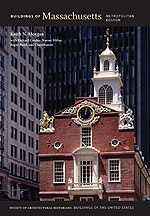You are here
The Foley (Boston Sanatorium)

In 1906 the city acquired this former private estate to construct a hospital for consumptives. The retirement home of John Connes, former California senator and close friend of Abraham Lincoln, still stands on the estate where it was used as a superintendent's residence (249 River Street). Maginnis and Walsh designed the original hospital buildings, constructed between 1907 and 1920, their major surviving work being the Tudor-style Administration Building, built in 1910. In 1928–1930 James Ritchie and Associates, the firm that
Writing Credits
If SAH Archipedia has been useful to you, please consider supporting it.
SAH Archipedia tells the story of the United States through its buildings, landscapes, and cities. This freely available resource empowers the public with authoritative knowledge that deepens their understanding and appreciation of the built environment. But the Society of Architectural Historians, which created SAH Archipedia with University of Virginia Press, needs your support to maintain the high-caliber research, writing, photography, cartography, editing, design, and programming that make SAH Archipedia a trusted online resource available to all who value the history of place, heritage tourism, and learning.














